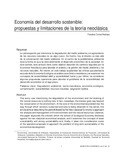Mostrar el registro sencillo del ítem
Economía del desarrollo sostenible: propuestas y limitaciones de la teoría neoclásica
| dc.creator | Correa Restrepo, Francisco | spa |
| dc.date.accessioned | 2016-01-29T23:02:36Z | |
| dc.date.available | 2016-01-29T23:02:36Z | |
| dc.date.created | 2003-12-31 | |
| dc.identifier.issn | 0120-6346 | |
| dc.identifier.uri | http://revistas.udem.edu.co/index.php/economico/article/view/1367 | |
| dc.identifier.uri | http://hdl.handle.net/11407/1894 | |
| dc.description | La preocupación por interiorizar la degradación del medio ambiente y el agotamiento de los recursos naturales no es algo nuevo. De hecho, hoy el interés va más allá de la conservación del medio ambiente. En el centro de la problemática ambiental está la forma en que se está obteniendo el desarrollo económico de la sociedad. En este sentido, este artículo tiene como objetivo describir los caminos seguidos por la Economía Neoclásica para abordar el análisis y la gestión del medio ambiente y los recursos naturales. Así mismo, en este trabajo se plantean las críticas que plantea la escuela de la Economía Ecológica al análisis económico neoclásico y se examinan los conceptos de sostenibilidad débil y sostenibilidad fuerte y, por último, se consideran algunas propuestas operativas para abordar el problema de la sostenibilidad del desarrollo económico en el lago plazo. | spa |
| dc.description.abstract | The worry over interiorizing the degradation of the environment and the draining of the natural resources is nothing new. In fact, nowadays, the interest goes way beyond the conservation of the environment. At the core of the environmental problem lies the way through which society–s sustained economy is being obtained. In this sense, this article aims at describing the paths followed by the Neo-classical Economy to approach the analysis and management of the environment and the natural resources. Likewise, this paper expounds the criticism which the school of Ecological Economy discloses against the neo-classical economical analysis; and it examines the concepts of weak sustainability and strong sustainability and, finally, it takes into consideration some of the operative proposals to approach the problem of long-term sustainability of the economical development. | eng |
| dc.format.extent | p.167-194 | spa |
| dc.format.medium | Electrónico | spa |
| dc.format.mimetype | application/pdf | |
| dc.format.mimetype | text/html | |
| dc.format.mimetype | ||
| dc.language.iso | spa | |
| dc.publisher | Universidad de Medellín | spa |
| dc.relation | http://revistas.udem.edu.co/index.php/economico/article/view/1367/1394 | spa |
| dc.relation | http://revistas.udem.edu.co/index.php/economico/article/view/1367/1404 | spa |
| dc.relation.ispartofseries | Semestre Económico; Vol. 6, núm. 12 (2003) | spa |
| dc.relation.haspart | Semestre Económico; Vol. 6, núm. 12 - julio/diciembre 2003 | spa |
| dc.rights.uri | http://creativecommons.org/licenses/by-nc-sa/4.0/ | * |
| dc.source | Semestre Económico; Vol. 6, núm. 12 (2003) | spa |
| dc.source | 2248-4345 | spa |
| dc.source | 0120-6346 | spa |
| dc.subject | Degradación ambiental | spa |
| dc.subject | teoría neoclásica | spa |
| dc.subject | economía ecológica | spa |
| dc.subject | contaminación | spa |
| dc.subject | sostenibilidad | spa |
| dc.subject | recursos naturales | spa |
| dc.subject | asignación óptima | spa |
| dc.title | Economía del desarrollo sostenible: propuestas y limitaciones de la teoría neoclásica | spa |
| dc.relation.citationvolume | 6 | |
| dc.relation.citationissue | 12 | |
| dc.relation.citationstartpage | 167 | |
| dc.relation.citationendpage | 194 | |
| dc.audience | Comunidad Universidad de Medellín | spa |
| dc.publisher.faculty | Facultad de Ciencias Económicas y Administrativas | spa |
| dc.coverage | Lat: 06 15 00 N degrees minutes Lat: 6.2500 decimal degreesLong: 075 36 00 W degrees minutes Long: -75.6000 decimal degrees | spa |
| dc.publisher.place | Medellín | spa |
| dc.relation.ispartofes | Semestre Económico | spa |
| dc.identifier.eissn | 2248-4345 | |
| dc.type.version | info:eu-repo/semantics/publishedVersion | |
| dc.type.driver | info:eu-repo/semantics/article |



